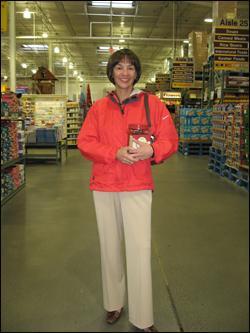Advertisement
Discount Stores Bulk Up On The Promise Of A Bargain, Says BJ's CEO
Resume
Recent data show retail sales dropped for a second month in April. Economists attribute the drop to rising unemployment. Meanwhile, the flailing economy is bolstering discount stores, such as Wal-Mart and Costco, as consumers look to cut back on spending.
BJ's Wholesale Club saw its first-quarter profits this year rise nearly 42 percent. The Natick-based chain introduced the warehouse club concept club to New England in 1984. Now it's the nation's third-largest chain, operating about 180 clubs in 15 states.
To find out how BJ's is boosting profits in the recession, we went to the Framingham store to speak with CEO Laura Sen.
Besides the very positive increase in first-quarter profits, consumer profit is up by 7 percent. What's driving all of that positive news for you?
BJ's CEO LAURA SEN: Well, there's no question in my mind that the consumer is really seeking value, and they understand that we have great values at BJ's. And, we've gone through an organizational transformation in the last couple of years, which coincided with the economic downturn, and that's really worked in our favor.
What do you mean by that? What kind of change did you undergo?
SEN: We really focused on value, we focused on a clarity of offerings so people find it easy to shop in our clubs — and that's really worked well.
As we stand here and look around, this BJ's store, like all BJ's stores, is just chock full of stuff — and a wide variety of stuff, everything from televisions to bicycles to fresh fruit and fresh vegetables to women's clothing. Of all the categories of items in here, what's really hot right now?
SEN: The fresh food area has really been the engine of our business for the last couple of years. And therefore, we've positioned our assortments around that concept.
As we came through the produce aisle, I noticed you reach out and squeeze the avocados and squeeze a melon to see if they were ripe...
SEN: That's an area where you have to be right not every day, not every week, but every hour. It's a very difficult business, we've gotten better at it, we're still working on making improvements in that area, but it's definitely something I scrutinize every time I come in the club.
In some of the cases in the food department, you're selling prepared food. Is that a big portion — is that a growing portion — of the market?
SEN: That is a very strong, growing part of our business. Restaurant dining has suffered during this economic downturn. But people still don't want to prepare food. You know, a lot of people don't know how to cook — I'm one of them.
And so, when you can go into the prepared foods section, buy a familiar brand, get the restaurant quality, but not have the hassle of cooking. So, it ends up being a better value than going out to the restaurant, and that has grown disproportionate to the rest of our business.
What are the main challenges facing BJ's right now, in this economy?
SEN: I would say the discretionary spending is still tough. So when you look at luxury items — like jewelry, home, perhaps — you know, you don't need a new set of towels to redecorate, or a new set of sheets. Apparel is doing OK. But anything that's really not a necessity is a harder sell these days.
You sell gasoline at some of your stores. And from what I understand, sales of gasoline are down.
SEN: Yes, dramatically. Last year when gas prices were rising every week, our gallonage was growing by leaps and bounds. Now, there's not as much drive for the consumer to go the extra few miles to a BJ's to get the best price on gasoline, which is to be expected.
Is the down economy advantageous to a warehouse store that pushes value like BJ's?
SEN: What I have seen, and I've been in retailing for 30 years, is there has been an ongoing migration to value.
What does that mean for BJ's when the country starts coming out of a recession?
SEN: Oh, I'm not worried one bit. 'Cause let me tell you, if you are used to, you know, getting a great price, why would you go back to paying more?
This program aired on June 2, 2009.
